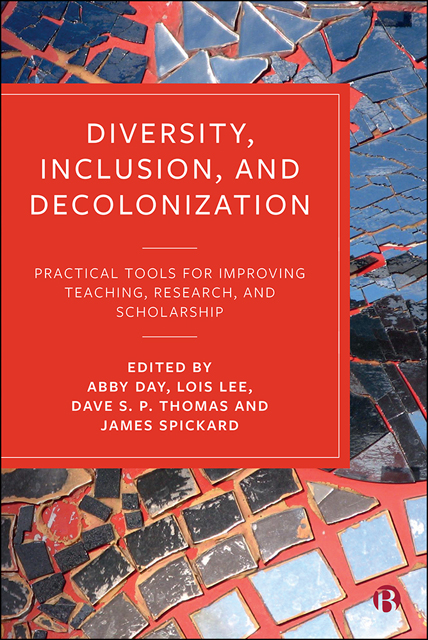 Diversity, Inclusion, and Decolonization
Diversity, Inclusion, and Decolonization Book contents
- Frontmatter
- Contents
- List of Figures and Tables
- Notes on Contributors
- Acknowledgements
- Typographical Note
- Introduction: Why Diversity, Inclusion, and Decolonization Matter
- Part I Changing Universities
- Part II Diversifying Curricula
- Part III Diversifying Research and Scholarship
- Part IV Overcoming Intellectual Colonialism
- Epilogue: What We Have Learned
- Index
4 - This Island’s Mine: University Teaching as Inclusive Dramaturgy
Published online by Cambridge University Press: 13 October 2022
- Frontmatter
- Contents
- List of Figures and Tables
- Notes on Contributors
- Acknowledgements
- Typographical Note
- Introduction: Why Diversity, Inclusion, and Decolonization Matter
- Part I Changing Universities
- Part II Diversifying Curricula
- Part III Diversifying Research and Scholarship
- Part IV Overcoming Intellectual Colonialism
- Epilogue: What We Have Learned
- Index
Summary
Prologue: setting the scene
Before the action of the class starts, I prepare the space. I’m lucky; I’m in a studio. There is no fixed seating and I have 30 minutes to prepare. Typically, when teaching in a United Kingdom (UK) university, the space is preconfigured in ‘sage on the stage’ mode (King, 1993), where banks of students face the font of wisdom. You’d be fortunate to have a five-minute turnaround. This, however, is a ‘black box’ studio with some audio-visual equipment. The lack of natural light is compensated by the ability to control lighting. I can project images and I can play music. There are walls which I can reimagine, including moveable theatrical drapes. I have enough chairs for participants and a trestle table. I get to work. I have prepared a sign – deciding it will be handwritten. Cued by Harrison Owen (2008) and his advice about setting up Open Space Technology I appreciate that handwritten signs are friendlier, more welcoming and less corporate than something printed. The sign outlines the central question of the workshop: ‘How does understanding global issues affect our work on play texts?’, written purposely in plain English. I could have written: ‘An exploration of postcolonialism in The Tempest’, but it was important not to present a barrier of assumed knowledge. I have, after all, responded to students expressing their alienation from theory courses, who have told me that terminology and lack of familiarity with the canon present barriers for them. I have prepared something typed, but it is projected: the lyrics to Bob Marley’s ‘Redemption Song’. I scatter the chairs around the space randomly. I place other materials for work later in the session on the trestle table – pens, paper, masking tape, exercise books (for students that want to jot something down). I arrange the materials like a buffet, as if I’m setting up a party. I want the space to be convivial, to spark curiosity and to encourage conversation and creativity. Just before my guests are due to arrive, I play ‘Redemption Song’ on repeat and realise that no matter how much you prepare, the value of the event will always be an act of co-creation with others.
- Type
- Chapter
- Information
- Diversity, Inclusion, and DecolonizationPractical Tools for Improving Teaching, Research, and Scholarship, pp. 64 - 80Publisher: Bristol University PressPrint publication year: 2022


